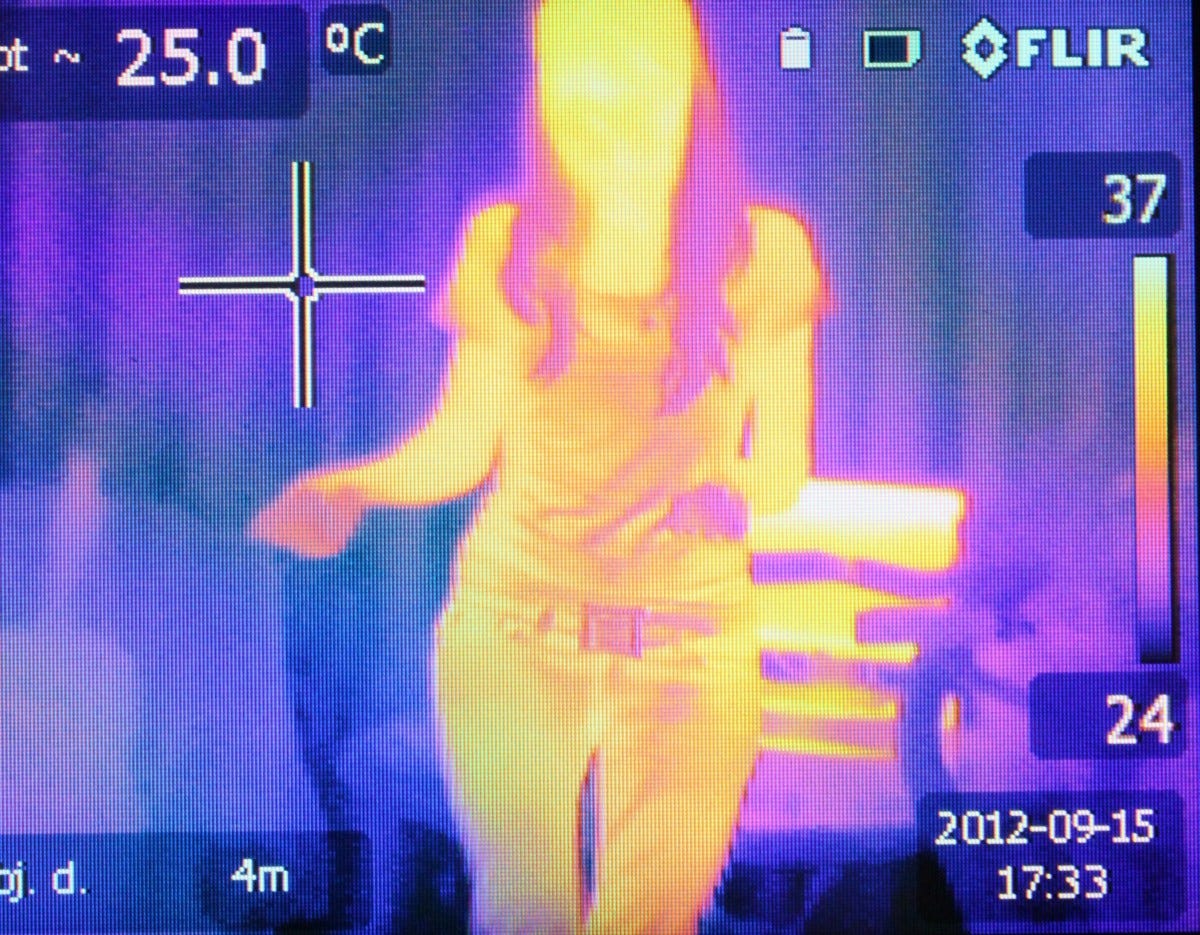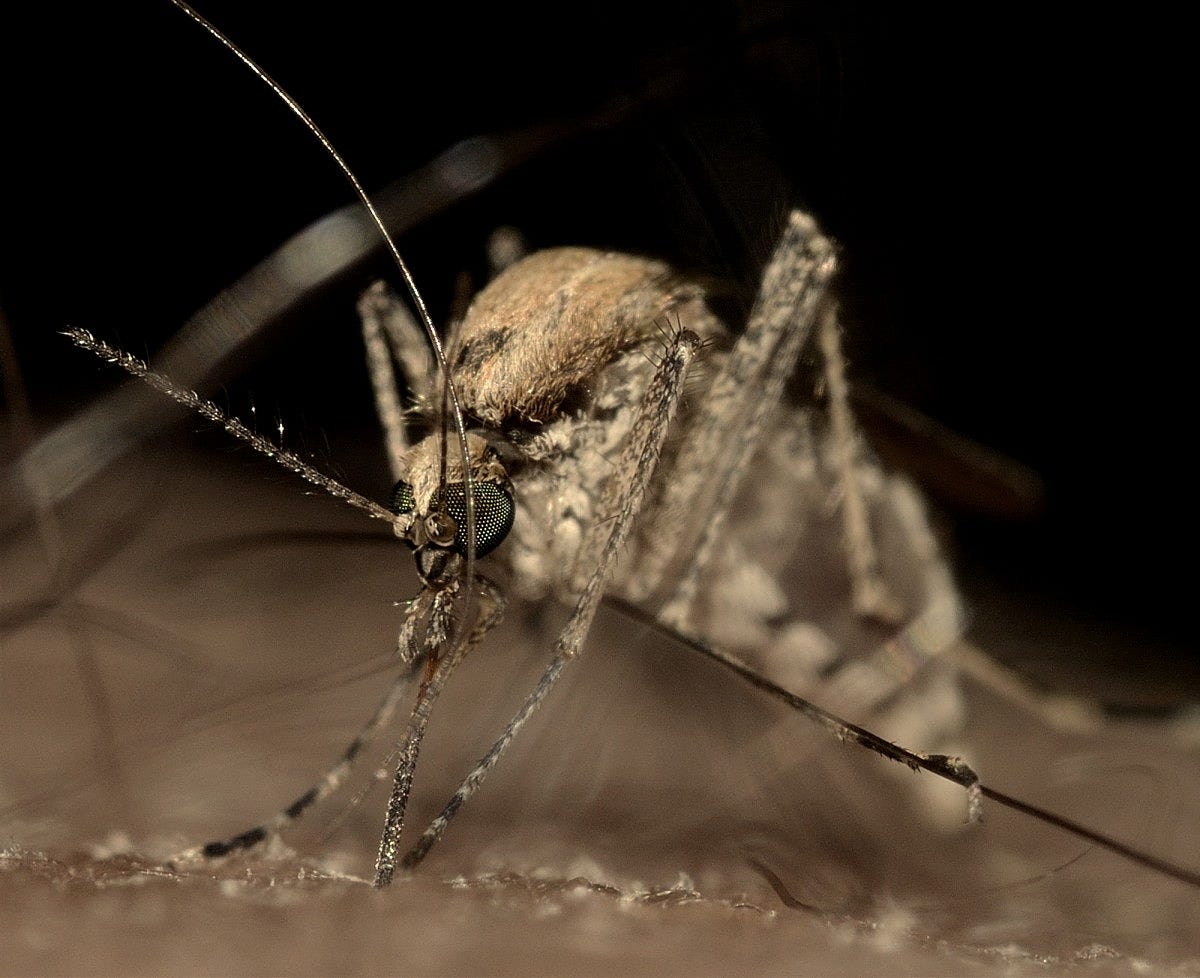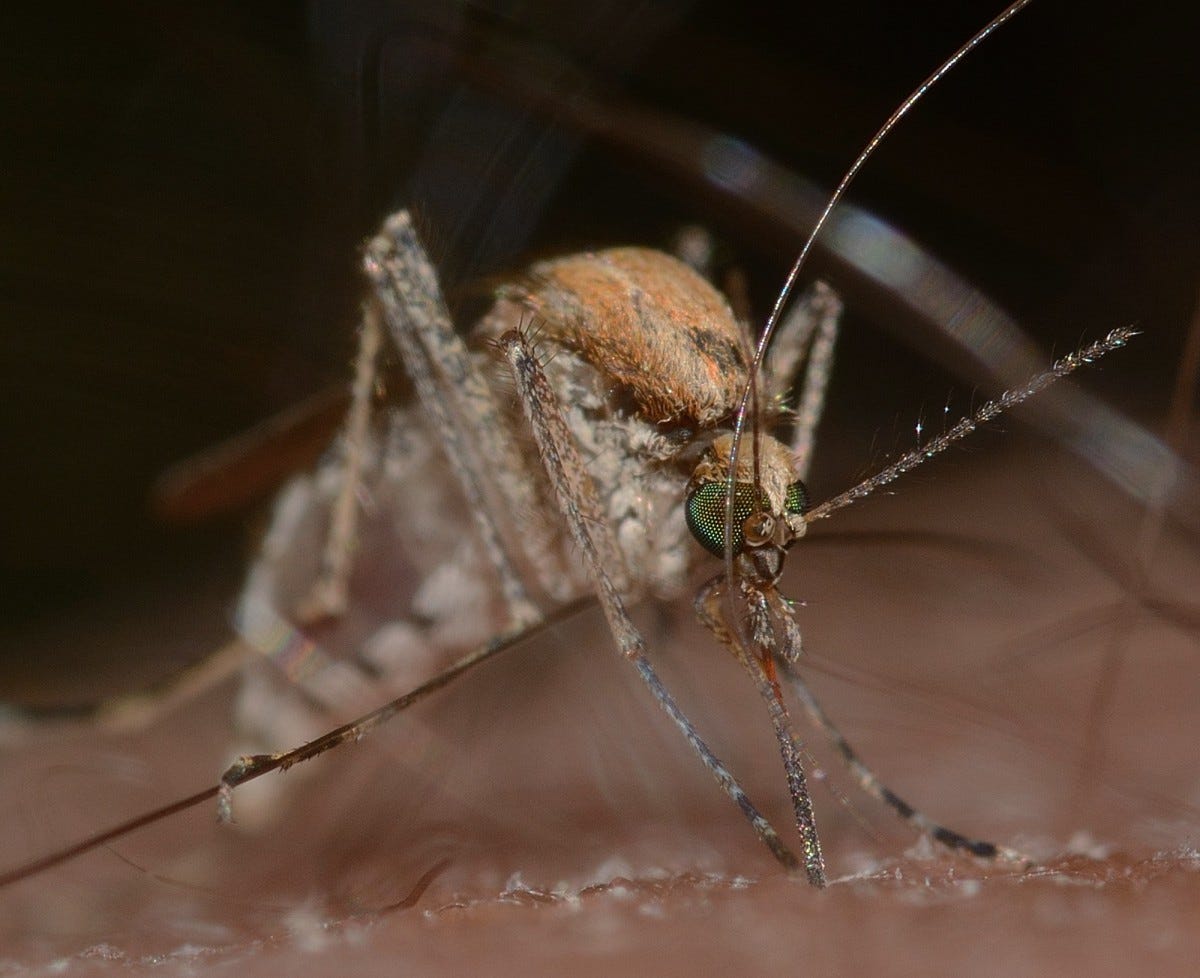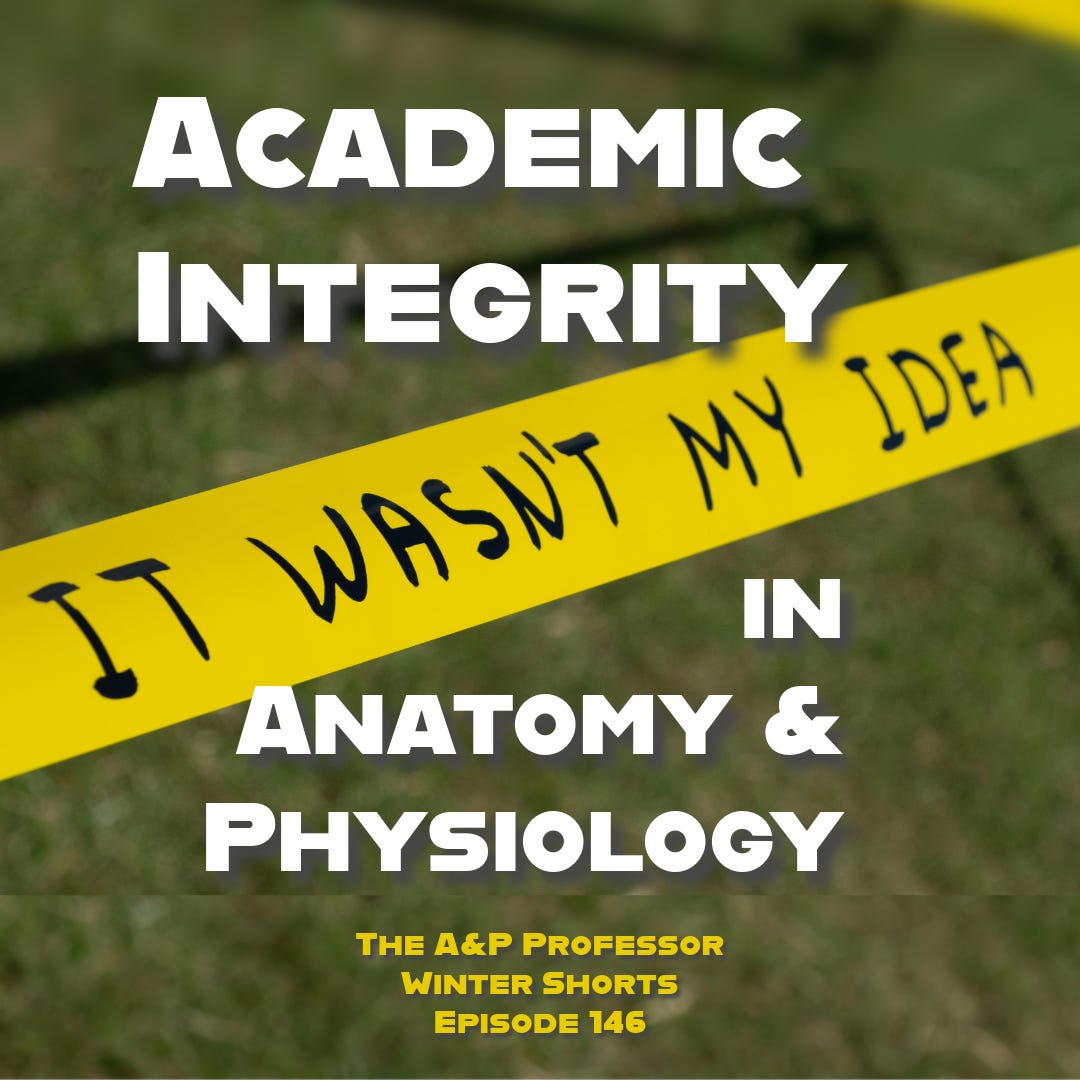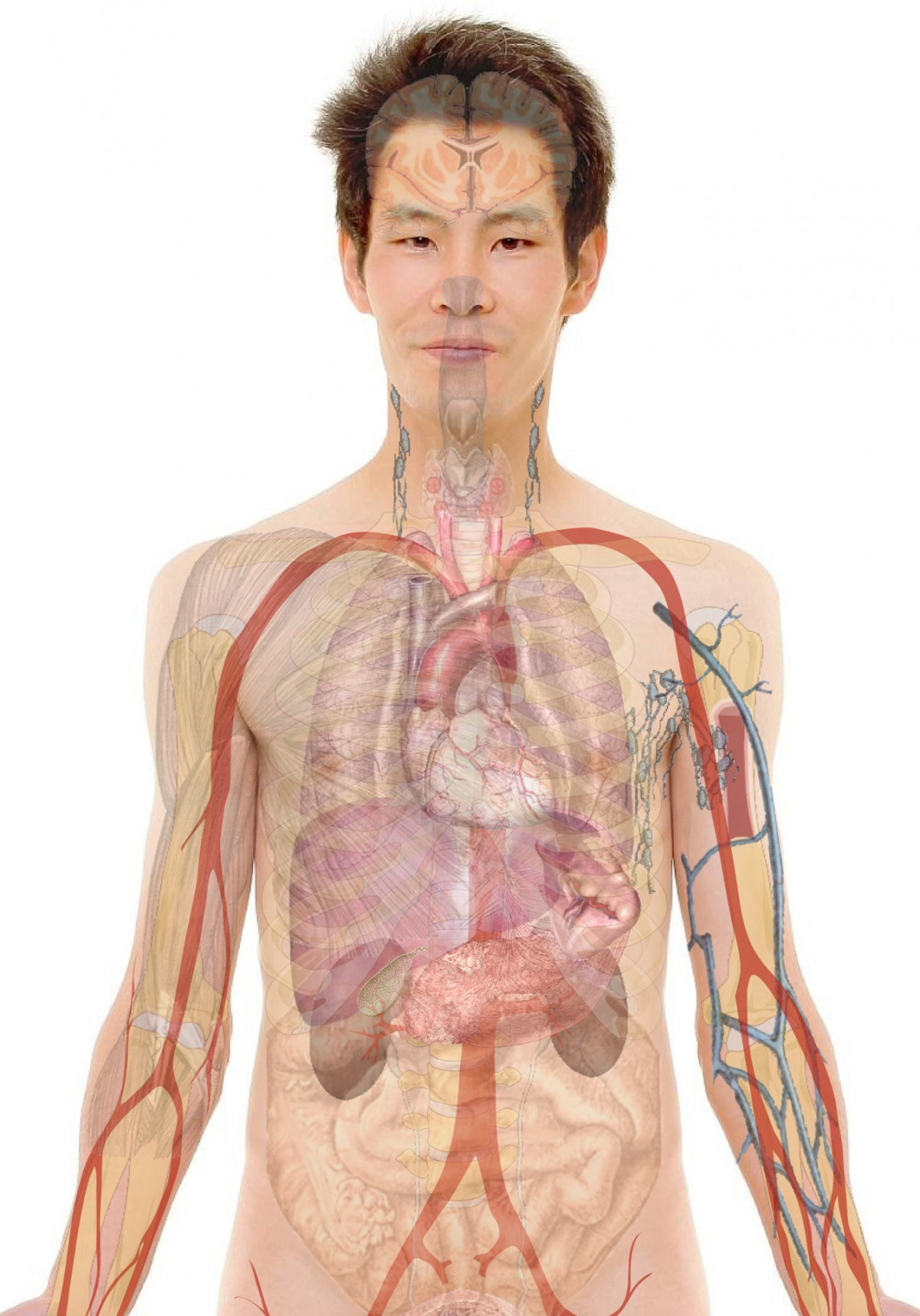Sci-Ed Update 325
Mitochondria shorten lives, weight bias, attitudes about college, weekend workouts, mosquito menace, aging inflection points, integrity in A&P course, anatomy skills, more!
Mosquitoes can sense our body heat
Mosquitoes are among the deadliest animals in the world because of their incredible ability to spread disease by finding blood to suck. A team of scientists found that mosquitoes may be able to sense our heat signatures using infrared detection. The infrared radiation from a source that is about the same temperature of human skin can double the number of hosts mosquitoes can seek out. In their experiments, the mosquitoes overwhelmingly navigated toward the source with body heat, as opposed to the one that just had body odor and carbon dioxide (CO2). We already knew that they can sniff out the carbon dioxide that we exhale, but this may be yet another tool that helps them track human prey. The discovery is described in a study published August 21 in the journal Nature.
Read more→ AandP.info/kkm
Mosquito-borne illnesses are spiking across the world
Climate change is extending mosquito season and helping to drive outbreaks of dengue fever, Oropouche virus and eastern equine encephalitis.
A rare virus spread by mosquitoes has killed five people in the US this year. The latest death, announced on 27 August, occurred in New Hampshire and is the state’s first known case of the virus since 2014. Massachusetts, New Jersey, Vermont and Wisconsin have each reported a case as well. The situation has become so concerning that some towns have closed parks after dusk – peak mosquito-biting hours – and restricted outdoor activities and public events.
Read more→ AandP.info/f5u
Missouri teenager left paralyzed and on a ventilator from West Nile virus
A St. Louis County, Missouri, teenager suffered rare complications from West Nile virus that has left him paralyzed and on a ventilator.
John Procter V said his son’s symptoms started earlier this month when the recent high school graduate began experiencing headaches and dizziness.
As the symptoms got worse, 18-year-old John Procter VI, who the family calls “BB,” started having slurred speech and trouble raising his arms up, his father told NBC affiliate KSDK of St. Louis.
The teen was placed in the intensive care unit at the hospital and diagnosed with West Nile virus, which is commonly spread through infected mosquitoes. There is no vaccine or treatment.
The family said the teen is paralyzed from the neck down and was placed on a ventilator to help him breathe.
Severe complications from West Nile are rare. About 1 in 150 people experience symptoms that affect the central nervous system such as inflammation of the brain or meningitis, inflammation of the membranes that surround the brain and spinal cord, according to the Centers for Disease Control and Prevention. Symptoms of severe illness include neck stiffness, headache, disorientation, and paralysis. Recovery can take weeks or months, and some effects can be permanent.
Kevin Patton comment→ Dr. Anthony Fauci was recently reported as having West Nile virus. Happily, another serious mosquito-borne viral condition—St. Louis encephalitis—has no human cases this year.
Read more→ AandP.info/oy4
Humans age dramatically at two key points in their life, study finds
Scientists have found that human beings age at a molecular level in two accelerated bursts – first at the age of 44, and then again at 60.
In a study published in the journal Nature Aging, scientists at Stanford University and Nanyang Technological University in Singapore followed 108 participants over several years to observe aging changes in their molecules — RNA, proteins and participants’ microbiomes.
The scientists found that human aging does not happen in a gradual, linear way. Rather, the majority of the molecules they studied showed accelerated, non-linear changes at the ages of 44 and 60.
Kevin Patton comment→ I think I’ve already had more than two of those inflection points. In fact, I feel one coming on now…
Read more→ AandP.info/pew
Anatomy of Trust: Promoting Integrity in A&P Education
Episode 146 of The A&P Professor podcast is one of our winter shorts, where I replay interesting segments from previous episodes. In this one, we discuss the importance of academic integrity in the Anatomy & Physiology course. We emphasize the need to incorporate discussions about integrity in the syllabus and course materials and share real-life examples of violations in the healthcare field. We highlight how dishonesty can have serious consequences and discuss strategies for prevention, such as using multiple test versions and unique topics for papers/projects. Providing examples of acceptable practices and discouraging unethical behavior foster a culture of integrity. We invite listeners to contribute their own strategies for promoting academic integrity.
To listen to this episode, click on the play button above ⏵ (if present) or this link→ theAPprofessor.org/podcast-episode-146.html
Does dissection influence weight bias among doctor of physical therapy students?
Anatomy with human dissection may help to develop respect for the human body and professionalism; however, dissection may worsen students' attitudes about body weight and adiposity. The purpose of this study was to measure weight bias among Doctor of Physical Therapy (DPT) students enrolled in gross anatomy and determine if, and how the experience of dissection impacts weight bias.
Ninety-seven DPT students (70 University of Colorado [CU], 27 Moravian University [MU]) were invited to complete a survey during the first and final weeks of their anatomy course. The survey included demographic items, two measures of weight bias—the Modified Weight Bias Internalized Scale (M-WBIS) and the Attitudes Towards Obese Persons (ATOP) Scale—and open-ended questions for the students who participated in dissection (CU students) that explored attitudes about body weight and adiposity.
At baseline, there were no significant differences (p > 0.202) in ATOP, M-WBIS, or BMI between the two universities. The mean scores on both the ATOP and M-WBIS indicated a moderate degree of both internalized and externalized weight bias.
There were no significant changes in ATOP (p = 0.566) or M-WBIS scores (p = 0.428). BMI had a low correlation with initial M-WBIS scores (⍴ = 0.294, p = 0.038) and a high correlation with change scores in CU students (⍴ = 0.530, p = 0.011). Future studies should utilize the same measures of weight bias in other healthcare trainees to facilitate comparison and incorporate larger populations of DPT students.
Read more→ AandP.info/7hs
Giant Study Reveals What Happens if You Don't Exercise Until The Weekend
The health benefits of exercise – which include reduced risk of chronic diseases such as heart disease and dementia – can seem out of reach due to the pressures of work and life.
But a new study published in the journal Nature Aging offers some good news for people who struggle to fit regular exercise into their weekday schedules.
The findings suggest "weekend warriors" – those who get most of their exercise on the weekend – may enjoy the same brain health and mental health benefits as those who exercise regularly throughout the week.
Read more→ AandP.info/y9m
General Skills Amidst the Details: Alternative Learning Objectives and a Framework of Competencies for Human Anatomy
The field of anatomy is often seen by non-anatomists as concerned primarily with the tasks of locating, naming, and describing structures; these tasks, in turn, are often assumed to require only lower-order cognitive skills (LOCS), i.e., the Knowledge or Comprehension levels of Bloom's taxonomy. Many non-anatomists may thus believe that studying anatomy does not develop transferable higher-order cognitive skills.
Published lists of anatomy learning objectives (LOs) might reinforce this view by focusing attention on numerous details of specific structures and regions. To explore this issue further, we have analyzed the structure of published peer-reviewed LOs by characterizing their organization (single-tiered or multi-tiered), inclusion of function, use of action verbs, and dependence on or independence of context. Our results suggest that previously published LO lists, despite their value, may not fully showcase opportunities for students to develop higher-order skills.
In the hope of stimulating further discussion and scholarship, we present here a two-tiered framework of human anatomy competencies, i.e., generalizable skills beyond straightforward recognition and memorization. This framework, which is intended to be both student-facing and faculty-facing, illustrates how anatomy courses may be reframed as opportunities to think critically and develop sophisticated, professionally relevant skills.
Read more→ AandP.info/vbi
Mitochondria Dump DNA in The Brain, Potentially Cutting Years Off Our Lives
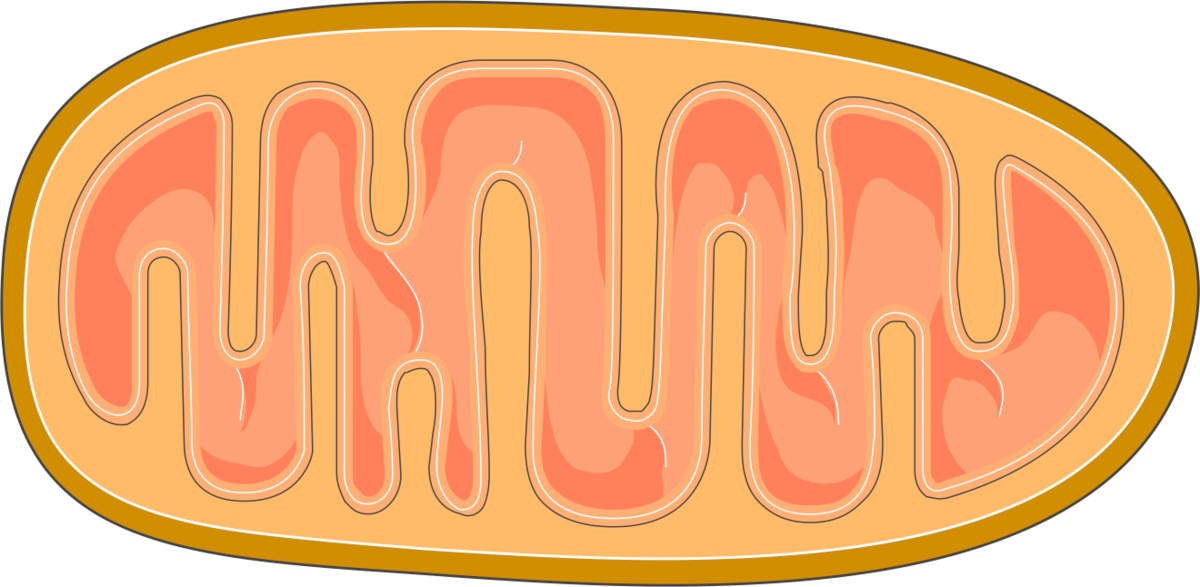
Scraps of DNA discarded by our neurons' power units are being absorbed into our nuclear genome far more frequently than assumed, potentially putting our brains at greater risk of developing life-threatening conditions.
An investigation by a team of researchers led by Columbia University in the US has found individuals with higher numbers of nuclear mitochondrial insertions – or NUMTs (pronounced new-mites) – in their brain cells are more likely to die earlier than those with fewer DNA transfers.
Read more→ AandP.info/vfi



